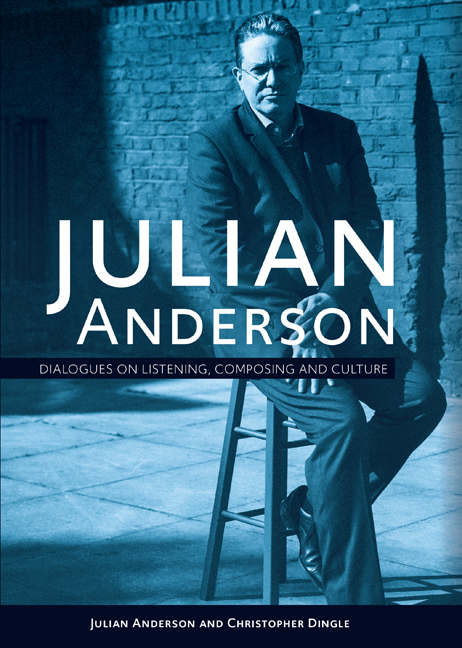Book contents
- Frontmatter
- Contents
- List of Illustrations
- Foreword
- Acknowledgements
- Introduction
- Prelude – Jeux: A Conversation Over Lunch
- Conversation One Origins
- Conversation Two Enthusiasms
- Conversation Three Training
- Conversation Four Dance
- Conversation Five Folk
- Conversation Six Composing (or Not)
- Conversation Seven Understandings
- Conversation Eight Beginnings (and Endings)
- Conversation Nine Puzzles
- Conversation Ten Singing
- Conversation Eleven Olly
- Conversation Twelve Memory
- Conversation Thirteen Opera
- Conversation Fourteen Practices
- Conversation Fifteen Outsiders?
- Conversation Sixteen Quartets
- Conversation Seventeen Advocacy
- Conversation Eighteen Partnerships
- Coda: Multiple Choices
- Chronology
- List of Personae
- Glossary of Musical Terms
- Macrotonality
- Catalogue of Published Works by Julian Anderson
- List of Recordings of Julian Anderson’s Music
- Bibliography
- Discography
- Index
Conversation Three - Training
Published online by Cambridge University Press: 16 September 2020
- Frontmatter
- Contents
- List of Illustrations
- Foreword
- Acknowledgements
- Introduction
- Prelude – Jeux: A Conversation Over Lunch
- Conversation One Origins
- Conversation Two Enthusiasms
- Conversation Three Training
- Conversation Four Dance
- Conversation Five Folk
- Conversation Six Composing (or Not)
- Conversation Seven Understandings
- Conversation Eight Beginnings (and Endings)
- Conversation Nine Puzzles
- Conversation Ten Singing
- Conversation Eleven Olly
- Conversation Twelve Memory
- Conversation Thirteen Opera
- Conversation Fourteen Practices
- Conversation Fifteen Outsiders?
- Conversation Sixteen Quartets
- Conversation Seventeen Advocacy
- Conversation Eighteen Partnerships
- Coda: Multiple Choices
- Chronology
- List of Personae
- Glossary of Musical Terms
- Macrotonality
- Catalogue of Published Works by Julian Anderson
- List of Recordings of Julian Anderson’s Music
- Bibliography
- Discography
- Index
Summary
This conversation essentially picks up the baton from Conversation One, ‘Origins’, looking at Anderson's training beyond school. It starts with considering John Lambert's characteristics as a teacher, from first meeting to his death in 1995, then the contrasting approach of Alexander Goehr. The conversation then moves on to contact with various key figures in Anderson's formation, from seeking out Tristan Murail for private lessons in order to understand spectral music, via summer courses with Olivier Messiaen and Per Nørgård to a robust encounter with Ligeti. Along the way there are fond reminiscences of the rich intellectual possibilities offered by Paris, the early perception of spectral music and the relationship to it of Nørgård and Rădulescu, as well as the quirks of the ondes Martenot.
CD: I wonder if we can talk about some of the remarkable people you have had as teachers in various settings. John Lambert was your first composition teacher beyond school. Why did you approach him?
JA: I went to John Lambert because both Olly Knussen and John Baird said I should. John Baird had been replaced by Olly Knussen when he left the Junior College to teach at Westminster School. They met once, because John had to show him the ropes of the new job, but independently from each other they both knew that John Lambert was a very good teacher. John Baird handed on about six or seven composers to John Lambert – one of the others was Richard Blackford. Since both arrows pointed towards Lambert, the choice was not accidental.
CD: Was this at the Royal College [of Music]?
JA: No, I studied with John Lambert for two years before College.
CD: Right, so what was your first meeting like?
JA: The first thing he looked at was my String Quartet No. 1 ‘Light Music’ – the title being in the sense of light diffused in a prism, not in the other sense of that expression! He looked at that score, which I sent him in advance. I went down to his house in Brighton and he pored over it in enormous detail. He checked up on ring modulation and all of that, and he asked me a lot of details about the technical procedures behind the piece. The first half of the session was him saying, ‘I see, and then what happens here technically?
- Type
- Chapter
- Information
- Julian AndersonDialogues on Listening, Composing and Culture, pp. 51 - 70Publisher: Boydell & BrewerPrint publication year: 2020



